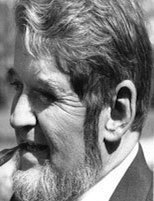 Dr. George Duncan - 1967 to 1997
Dr. George Duncan - 1967 to 1997
Dr. George Duncan's career at Walsh University spanned more than 30 years. He served as chair of the history department as well as a professor of history and political science. For countless students and former colleagues, George was an advocate and mentor. Duncan joined Walsh in 1967 after teaching junior high school for 12 years. He taught history and political science at Walsh, and served as chairman of the history department. Dr. Duncan was “a regular fixture” at student and alumni events during his tenure at Walsh and even after his retirement. In 2008, he was honored with Walsh’s Lifetime Achievement Award. He passed away at the age of 78 in March 2009.
More reflections of Dr. Duncan.
By Koop Berry, Professor, Government & Foreign Affairs
"To this day, it is still one of the most surprising things to happen to me while working at Walsh.
Anyone that knew Dr. George Duncan knew him to be a peaceful, soft spoken and kind-hearted man. He was never in a hurry, never seemed to get rattled, and I know he hated conflict. His students loved him, his colleagues respected him, and I considered him a mentor. He was known in his younger years at Walsh for his red beard and pipe. He was the proud picture of true Scotsman -- right down to his chivalrous manner, which I saw firsthand early in my career.
I came to Walsh in the early 1990s for my first assignment as an instructor of political science. It was Dr. Duncan who hired me and was the Chair of my department. Our offices at that time were located in La Mennais Hall and I took the office three doors away from Dr. Duncan. I was one of only a few young female professors on campus at that time and encouraged my students to participate and speak their minds in class. That's how I ended up in a heated argument with an older male over a grade one afternoon. The student was actually older than me. From my perspective, this made George’s reaction to him more meaningful.
We were standing in my office while the student adamantly protested (honestly, he was yelling) about his grade, which he felt was undeserved. Anyone who has been in La Mennais knows that the hall is very narrow and the offices are close together. It was later in the day, and I really didn't think anyone was around. Not until I heard a baritone voice behind me say very stern and loud, "Young man! You will not speak to Professor Berry in this manner!"
It was Dr. Duncan and, to be honest, I don't know who was in more shock -- the student or me! I had never heard George raise his voice like that and after all these years, I can't recall another time his voice reached those decibels!
"You would not speak to Dr. Vazzano like this and you certainly would not speak to me like this! You need to apologize this instant to Professor Berry," he said.
Dr. Duncan gave me a long appraising look and walked back into his office. Later the student returned to my office and we talked it over - without the raised voices. That later exchange probably would've never happened if it hadn't been for Dr. Duncan intervening. In fact, I had that same student in another class of mine later in his career at Walsh. We got along just fine, but he never questioned another one of my grades again."
